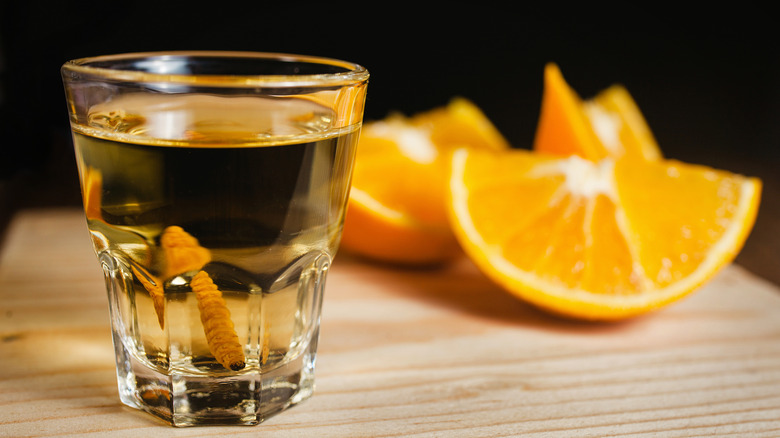The Biggest Misconception About Tequila Worms Is Right In The Name
When you were first introduced to tequila as a spirit, what thoughts about it came to mind? Did you instantly crave a margarita? Did you consider its unique, slightly sweet, earthy flavor profile? Or did you imagine a bottle with a worm sitting at the bottom? If you are part of the last group, you're not alone. Many people associate tequila with tequila worms; however, there is not a single bottle of tequila that contains one. That is because the practice of bottling liquor with a worm inside does not come from tequila at all, but instead from a type of mezcal.
While there are differences between tequila and mezcal, they are in the same family of spirit. Just like bourbon is a type of whiskey, tequila is a type of mezcal. This is because all mezcals, including tequila, are made using the heart of the agave plant, called the piña.
With the farming of agave comes an infestation of maguey worms — the tequila worms in question, which like to eat the agave. This is not technically a problem; the worms themselves are considered a prized ingredient in many dishes and are harvested separately to be used for those purposes. As such, it is unlikely that the worms ever end up in either of these spirits by accident — in fact, the myth that they are in most tequilas or mezcals at all is largely a marketing ploy. Maguey worms, also known as gusano, can only truly be found in one unique variety of mezcal: mezcal con gusano.
Why is there a worm in mezcal con gusano?
Mezcal con gusano is what it says on the label: It is the version of the spirit that adds a gusano, or a maguey worm, to the bottle when it is made. The addition is intentional, and it all began in the mid-1900s with one man: Jacobo Lozano Páez. He discovered that the addition of the maguey worm changed the flavor of the mezcal. The worms do have a nutty, smoky taste; however, the smokiness of mezcal can largely be attributed to the smoking of the agave during the cooking process. A far better way to add the worm's flavor is by spiking your drink with sal de gusano, a special seasoning made from the worms.
It is theorized that the main reason maguey worms are still found in this variety of mezcal is, again, due to its marketing power to both differentiate the spirit and generate word-of-mouth. Many rumors stem from the presence of the worm, ranging from it being able to boost virility, bring the drinker good luck, or guarantee the quality of the liquor. None of these have been proven, of course, but you can't underestimate the power of a unique experience or a good story.

